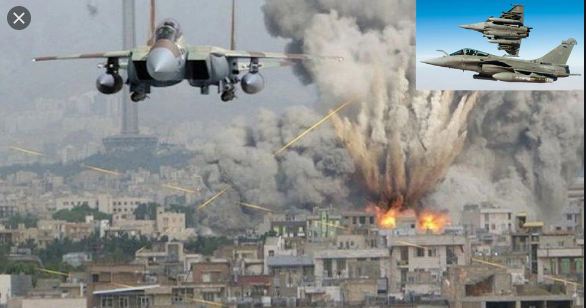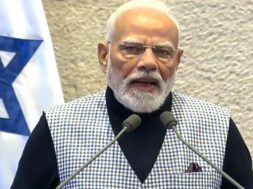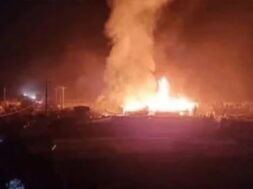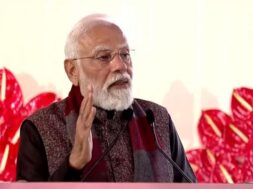
Virendra Pandit
New Delhi: As the toll in Monday’s terror attack in the Austrian capital of Vienna mounted to five, it has emerged that France may have anticipated such attacks after it launched a crackdown on Islamic terrorists in its former African colonies in recent past.
A French airstrike on Friday last against terror nurseries in its former African colonies killed 50 al-Qaeda-linked terrorists in Mali alone.
The West’s collective might against Islamic insurgents and terrorists is expected to unfold in full fury once the new President of the US takes office in January 2021.
French President Emmanual Macron, who has emerged as the global voice against Islamic terrorism and the chief target of Muslim militants, vowed to weed out the scourge.
The French resolve was also reflected when Prime Minister Jean Castex warned the schools of action against students refusing to pay tributes to history teacher Samuel Paty, who was beheaded by a Chechen terrorist on October 16.
The stern warning forced even Muslim students to bow in homage. Earlier, they had refused to pay tributes to those killed in the January 2015 attack on satirical magazine Charlie Hebdo after it published cartoons of Prophet Muhammad.
The former African colonies of France are seen as fresh nurseries of terror attacks in Europe. The recent attack in a Nice church was also carried out by a man of Tunisian descent, Ibrahim Issaoui.
In fact, much before the October 16 incident, France was already carrying out strikes in Africa to root out terror nurseries. In particular, it was targeting the Ansar ul-Islam gang, aligned with al-Qaeda.
The former colonial power was trying to stabilize Mali since leading a 2013 military operation to oust terrorists in the north. In fact, Mali had emerged as the cornerstone of French-led efforts to roll back jihadists, as Paris supported Ibraham Boubacar Keita, the President ousted by terrorists in a coup. France has been Mali’s main military, strategic and economic partner.
Already, France had stationed more than 5,000 French troops across the Sahel region, including in Mali.
The latest airstrike on central Mali was a sequel to this preparedness.
The airstrike was carried out near the borders of Burkina Faso and Niger, to aid the government troops to weed out an Islamic insurgency, French Defence Minister Florence Parly said after meeting members of Mali’s transitional government.
“On October 30 in Mali, the Barkhane force conducted an operation that neutralized more than 50 jihadists and confiscated arms and material,” she said, referring to the ongoing French-led anti-jihadist Operation Barkhane.
She said the operation was launched after a drone detected a “very large” motorcycle caravan in the “three borders” area. The group was “about to attack (an army) position in the region”.
Another operation, targeting the Islamic State in the Greater Sahara, was also underway, with 3,000 soldiers. “The results of the operation, launched about a month ago, would be announced in the coming days,” said an official. Apparently, terrorists were annoyed with this war launched against them by France and wanted to counter-strike.
Parly said the airstrike gave a “significant blow” to the Ansar ul-Islam group, linked to al-Qaeda via the GSIM alliance led by Iyad Ag Ghaly. Ghaly has emerged as a top jihadist leader in the Sahel region since the death of the al-Qaeda commander Abdelmalek Droukdel, who was killed by French forces in Mali in June.
The United Nations has nearly 13,000 troops deployed in Mali as part of its peacekeeping mission, known as MINUSMA, while France has 5,100 deployed in the Sahel region, media reports said.
Mali has been struggling to contain a brutal jihadist insurgency which first emerged in the north of the country in 2012, overtaking a rebellion by mostly ethnic Tuareg separatists.
France launched a military operation to drive back the Islamists in 2013, but fighting spread to central Mali, and to neighboring Burkina Faso and Niger, leaving thousands dead and hundreds of thousands forced to flee their homes. Many of them found refuge in Europe; and some of them may have ended up as terrorists themselves.
Vast swathes of Mali lie outside effective government control. Frustration over the seemingly endless conflict contributed to mass protests against President Ibrahim Boubacar Keita this year, culminating in his ousting in a military coup on August 18, 2020.
Many analysts argue that engaging in dialogue with jihadists is one of the few escape routes from Mali’s cycle of violence, and government leaders in Bamako increasingly view the option favorably.
Mali’s new interim government, which was appointed to rule for 18 months before staging elections, appears willing to engage in dialogue.
Last month, it secured the release of four hostages held by Islamist groups — including 75-year-old Sophie Petronin, the last remaining French hostage in the world — in exchange for about 200 prisoners, some of whom are thought to have been jihadists.
















